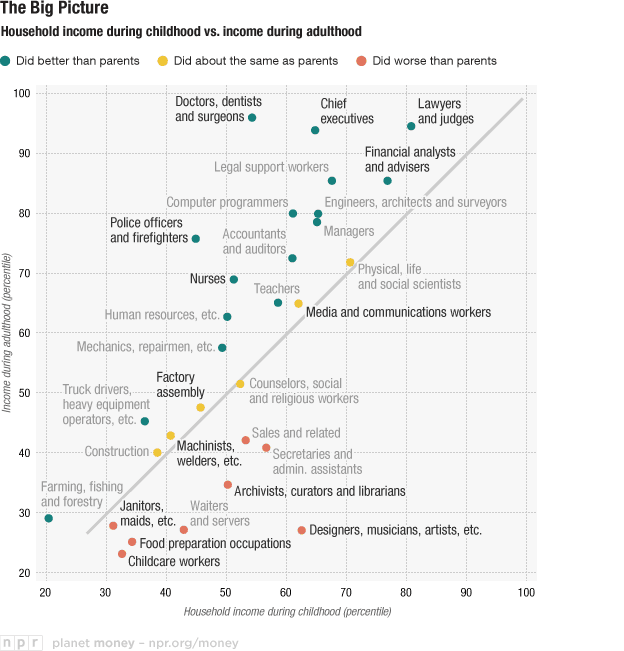Graph of the week: Who did better than their parents?
From the NPR blog (HT: ASI) comes a very interesting graph as an answer to an unusual question: who had richer parents, doctors or artists? Or to be more precise they were trying to figure out the link between household income during childhood and job choice during adulthood.
They used the data from a BLS survey tracking 12,000 people from 1979 when they were in between 14 and 22 years of age, to see how they did in life.
Looking at the graph below, the data shows all the professions that did better or much better than their parents. Some of these are expected: computer programmers, engineers, lawyers, managers, CEOs, auditors and accountants, financial analysts, media and communication workers, etc. However many are very surprising: police officers and firefighters, nurses (both very high up), truck drivers, heavy equipment operators, mechanics and repairmen, teachers and finally factory assembly workers, farmers, and construction workers! However take this with a pinch of salt - farmers or factory assembly workers may live only marginally better than their parents but it's not like they had a hard job beating them to it (they didn't have much to start with - the graph below this one illustrates this).

In a graphic form the table above looks even more interesting:
Again careful with this one - correlation does not imply causality! On first sight this suggests that those who lived in richer families earned more money later on. I would say this has more to do with career choice then family background.
Compare the extreme two categories from the first table: designers, musicians and artists with doctors, dentists and surgeons and with CEOs. They both came from relatively well off families. In fact artists had an even better starting position than most other occupations (short of only lawyers and judges and financial analysts). This could simply point out that some people made a bad decision with their careers, while others made very good ones: policemen and firemen vs waiters, janitors and machinists; childcare workers vs nurses and teachers; secretaries vs accountants; artists and librarians vs doctors and lawyers. Of course, these occupations are not substitutes for each other, but they can paint a clear picture of which occupations are dying, so if you're choosing to study in one of those areas you're molding your own destiny. People who end up as waiters or janitors didn't really have much of an option. But those who did, who came from relatively well off families and made a choice to study humanities - we can't really expect to feel sorry for them, do we? Don't get me wrong, I'm not against studying humanities or the arts (recall an earlier text of mine on the topic), however, if the demand for such jobs is low, the supply should adjust accordingly.





Comments
Post a Comment